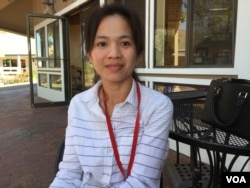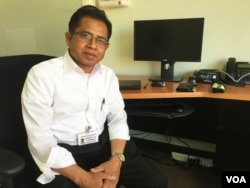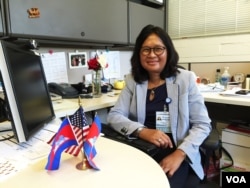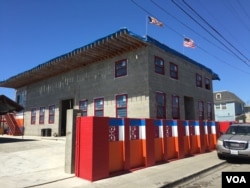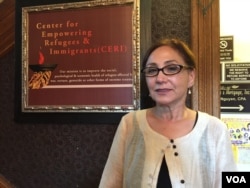With less than two months to the US presidential election, Khvat Saroeun had yet to register to vote.
The 66-year-old wants to vote, but said she felt left out of the election process because of her poor grasp of English.
“If there [is] anyone who can explain to me clearly about election process, I will go to vote,” said Khvat Saroeun, who came to the US from Cambodia more than 30 years ago.
“I don't know the names of all candidates and there is no one to help me learn more,” she told VOA Khmer.
Khvat Saroeun said she voted once before: In 2008, when Barack Obama won his first term as president. She understands the importance of voting, but she needs help with the registration process.
“Last time, when I voted [for Obama], there were people who helped explain the process and so I went to vote. This time, there is no one to explain to me clearly,” she said in a recent interview.
Khvat Saroeun is a member of the Cambodian-American community in California’s Oakland city area.
The community is estimated to be around 10,000-strong, yet the area lacks local Cambodian organizations that can help with such things a registering people to vote.
Previously, the community had strong organizations, including the long-running Cambodian Community Development, Inc. (CCDI), and the busy Oakland Cambodian Buddhist Temple, known locally as the “Old Temple”.
However, the CCDI closed down in 2011, partly due to lack of funds, and the “Old Temple” was destroyed by fire in February.
Local leaders are struggling to rebuild a new “Old Temple” in a yet undetermined location in the Oakland area, while a second temple, frequented by Khvat Saroeun, is still in its early stages of construction.
During past presidential and other elections, these organizations served as key channels and venues to reach out to Cambodian-American voters.
While it is still unclear whether the loss of these community channels has resulted in a decline in voter registration, it has certainly made outreach for election workers more difficult.
According to figures provided to VOA Khmer by the Alameda County voter registration office, 950 Cambodian-Americans had registered to vote by early September.
It is a figure that could be higher, said Khmer bilingual voter trainer Ho Maleny, if there were Cambodian organizations to facilitate voter outreach work.
“If there is a Cambodian association or an organization that helps US-Cambodians, it is even better because Cambodians can group at such association and we can easily do our outreach there,” Ho Maleny told VOA Khmer.
Ho Maleny says her work is more effective with other communities in the area that have strong local associations, such as the Chinese, Vietnamese, Filipino, and Latino.
“It's faster,” she explains.
“Usually we contact association leaders. Without them, I don't know who to contact. They usually can tell us about community events where many locals participate.”
Community leaders in Oakland agree that local associations are essentials for mobilizing Cambodian voters in local and presidential elections.
“If we compare with the Chinese and Vietnamese, they have many associations and usually gather their members for different events. They have a local center,” said In Suon, committee head of the now destroyed “Old Temple”.
“For Cambodians…our temple used to also function as a community center to help members, and where even city counselors used as a venue to explain about citizens' rights,” said In Suon, who helped register Cambodian voters in 2012.
“Nowadays, we don't have that anymore,” he said.
Until its closure in 2011, the CCDI community group organized programs on citizenship rights and election information for locals, the organization’s founder Ly Sambo told VOA Khmer.
Ly Sambo believes fewer Cambodian-Americans have registered to vote and have less access to important information since the CCDI was forced to close.
“Since our association closed, they do not get anymore help with citizenship tests or voter registration,” she said.
Many immigrants have lived for decades in the US but are still hesitant to apply for citizenship because of language barriers and a sense of trepidation with bureaucracy and such things as jury duty, Ly Sambo said.
Community organizations are particularly important in helping Cambodian immigrants apply for citizenship, and to understand their rights and responsibilities as citizens, such as voting in elections.
Along with other community leaders, In Suon and Ly Sambo said they continue to help Cambodian immigrants with voter registration on an informal basis.
In the absence of a formal community group, a small mental health non-profit organization, primarily focused on Cambodian clients, is helping to fill in the gaps with voter outreach in Oakland.
As part of its mental health mission, the Center for Empowering Refugees and Immigrants (CERI) helps with voter information for around 200 survivors of the Khmer Rouge regime who live in the Oakland area.
The center helped Khvat Saroeun to vote in the 2008 presidential elections.
One current client benefiting from CERI's voter outreach mission is Chhiv Chhy.
A Khmer Rouge survivor who has lived in Oakland since 1982, Chhiv Chhy said he is determined to vote in November’s presidential election.
Voting is a civic duty Chhiv Chhy said he swore to fulfill on becoming a US citizen.
“In front of immigration officials, we clearly swore with our right hands to [fulfill our civic duty to vote],” he told VOA Khmer.
Like Chhiv Chhy, many other clients of CERI vote, not only in presidential elections, but also in local elections, said Mona Afary, the organization’s executive director.
“We talk about it in our groups. We have groups every week and they are not only focused on psychological issues. For now the focus will [be] on elections for a while,” she said.
CERI is a short-term solution to voter outreach in the community, Afary said, adding that she hopes in the future Oakland will have functioning Cambodian organizations that can better assist locals.
For Khvat Saroeun, that was too long to wait.
Encouraged to vote for a new president in November, she sought the help of Ly Sambo and Ho Maleny. Along with several other elder member of Cambodian community, Khvat Saroeun found the help she needed, and was registered to vote a few days later.





